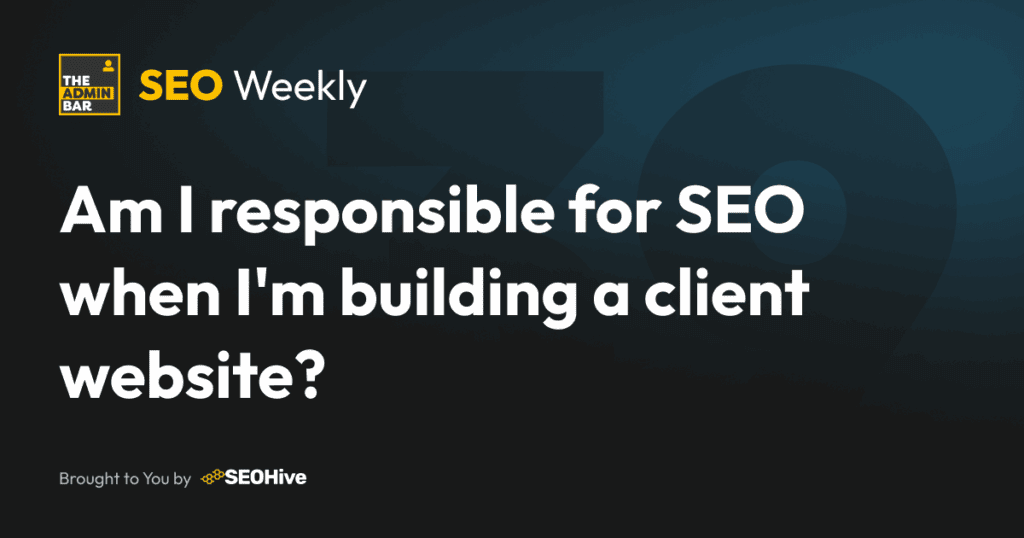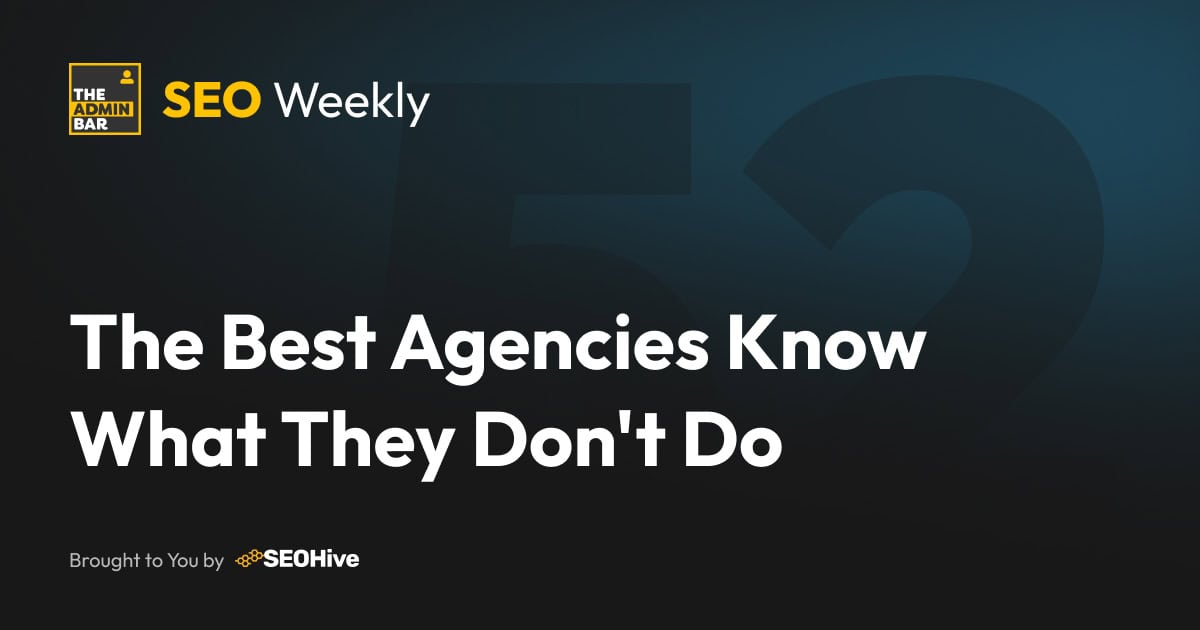This week’s topic is something that hits close to home for many of us in TAB… It’s a topic I’ve been vocal about because I believe we, as digital agencies, have a fundamental duty of care when building client websites and applications.
TLDR: Absolutely, yes.
This is my point of view: when clients come to us for a new website or web app, they’re not just purchasing a digital brochure – they’re investing in a business asset. They trust us as the web professionals to deliver something that will help their business perform better than what they had before.
Think about it this way: you wouldn’t buy an expensive car only to discover it had a cheap, unreliable engine under the hood. Similarly, you wouldn’t purchase a house to find it had no internal walls or proper foundations. Yet somehow, in our industry, we’ve allowed a culture where delivering a website without basic SEO foundations is considered acceptable.
It’s not.
Duty of Care
As digital agency owners, we have two core responsibilities:
1. Fit for Purpose: The website must actually serve the client’s business objectives. A beautiful site that nobody can find in search engines fails this basic test, just as much as a website where they can’t take the converting action (i.e. submit a form, complete a checkout, etc).
2. Technical Superiority: The new website should be technically better than what it replaces. This includes faster loading times, better mobile experience, improved accessibility – and yes, solid SEO foundations.
When a client invests their hard-earned money in a new website, they’re making a business decision based on trust in our expertise. We cannot – and should not – separate “web development” from “search visibility”.
What “SEO Responsibility” Actually Means
I’m not suggesting every web project needs a $10,000/month SEO retainer. But every website we build should include:
Technical SEO Foundations
- Proper URL structure and site architecture
- Meta titles and descriptions for key pages
- Header tag hierarchy (H1, H2, H3)
- Image optimization and alt text
- XML sitemaps and robots.txt
- Page speed optimization
- Mobile responsiveness
- SSL certificates
Basic On-Page Optimization
- Keyword research for primary pages
- Content structure that supports user intent
- Internal linking strategy
- Schema markup where relevant
Performance Monitoring Setup
- Google Analytics and Search Console installation
- Core Web Vitals monitoring
- Basic conversion tracking
These aren’t “extras” – they’re the digital equivalent of ensuring a house has proper electrical wiring and plumbing.
Side note: This is EXACTLY why I created the WordPress SEO Fundamentals Course – to bridge any knowledge gap agencies may have and ensure they deliver better SEO-ready WordPress Websites.
The Business Case for Inclusive SEO
Here’s what many agencies miss: including SEO foundations actually strengthens your business model.
1️⃣ Client Retention: Websites that perform well in search create happy clients who stick around for ongoing services.
2️⃣ Upselling Opportunities: A solid foundation makes it easier to sell advanced SEO services later.
3️⃣ Referral Generation: Clients whose websites actually work tend to refer more business.
4️⃣ Professional Reputation: Word travels fast in business communities about agencies that deliver results versus those that don’t.
The Most Common Excuses I Hear
“The client didn’t ask for SEO” They also didn’t ask for the website to be slow, break on mobile, or be invisible to search engines. Professional responsibility means delivering what they need, not just what they explicitly request.
“SEO is a separate service” Advanced SEO strategy is separate. Basic SEO foundations are part of professional web development – just like security, performance, and accessibility.
“It increases project costs” Good. Your projects should cost more because you’re delivering more value. Position it as “search-ready development” rather than an add-on.
“We’re not SEO experts” You don’t need to be an SEO expert to implement basic best practices. Partner with SEO specialists for advanced strategy, but master the fundamentals yourself. (Or reach out, between services like SEOHive, courses like WordPress SEO Fundamentals and dedicated coaching, there’s always a way you can find help).
If You’re Not Doing This, Do This First 👇
If you’re not currently including SEO foundations in your web projects, here’s how to start:
Audit Your Process: Review your current development workflow and identify SEO gaps.
Educate Your Team: Ensure developers understand basic SEO principles and can implement them during build (or get them to take WordPress SEO Fundamentals 😍)
Update Your Proposals: Include SEO foundations as standard, not optional.
Communicate Value: Help clients understand why these elements matter for their business success.
Partner Strategically: Build relationships with SEO specialists for advanced strategy work.
The Reality
When we build a website without proper SEO foundations, we’re essentially delivering a business asset with a fundamental flaw…Our clients trust us to be the web professionals. That trust comes with responsibility – not just to make things look good, but to make them work effectively for their business.
The question isn’t whether we’re responsible for SEO when building client websites. The question is whether we’re willing to embrace that responsibility systematically and use it as a competitive advantage. Because in a world where every business needs to be found online, delivering a website without SEO foundations isn’t just unprofessional – it’s a disservice to the clients who trust us with their digital future.
When you have the right processes and knowledge in place, including SEO fundamentals becomes as natural as ensuring the site is mobile-responsive or secure. It’s simply part of building websites properly.
If you’re looking to systematize this approach, you can find WordPress SEO Fundamentals at www.peteeveritt.com/wordpress-seo-fundamentals 🧐
Join the Conversation!
There's a dedicated thread on this post inside of The Admin Bar community. Join in on the conversation, ask questions, and learn more!
Group Thread





